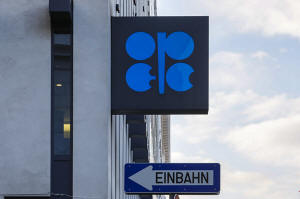Key members of OPEC+ alliance are putting off production increases amid
slack crude prices
 Send a link to a friend
Send a link to a friend
 [December 06, 2024] By
DAVID McHUGH [December 06, 2024] By
DAVID McHUGH
FRANKFURT, Germany (AP) — Eight members of the OPEC+ alliance of oil
exporting countries decided Thursday to put off increasing oil
production as they face weaker than expected demand and competing
production from non-allied countries — factors that could keep oil
prices stagnant into next year.
The OPEC+ members decided at an online meeting to postpone production
increases that had been scheduled to take effect Jan. 1. The plan had
been to start gradually restoring 2.2 million barrels per day over the
course of 2025.
That process will now be pushed back to April 1, 2025 and production
increases will gradually take place over 18 months until October 2026.
OPEC+, which includes Saudi Arabia as the dominant member of the OPEC
producers’ cartel, and Russia as the leading non-OPEC member in the
22-country alliance, have imposed several sets of cuts to agreed output
to support prices.
Oil prices have been slack due to weaker than expected demand from China
as well as increased production from countries like Brazil and Argentina
that aren’t in OPEC+.
Among the beneficiaries of the current state of the oil market are U.S.
motorists, who have seen gasoline prices fall to their lowest in 2 1/2
years to near $3 a gallon.
Oil analysts have been busy reducing their estimates for demand for next
year, meaning that OPEC+ could remain in a bind well into 2025.

The Saudis need oil revenue to carry out Crown Prince Mohammed Bin
Salman’s ambitious plans to diversify his country’s economy, including
the development of Neom, a $500 billion futuristic city in the desert.
For Russia, oil export revenues are a key pillar of state finances and
funding for the war against Ukraine. Holding back production risks
losing market share. Yet increasing production and sales could lower
prices in a global economy that analysts say is already well supplied
with oil.
U.S. oil has been stuck around $70 per barrel for weeks and traded
little changed at $68.75 on Thursday after the announcement, down from
$80 in August. International benchmark Brent crude traded at $72.57 per
barrel, down from around $80 in July.
One result of those slack prices is that U.S. average pump prices for
gasoline fell to $3.03 a gallon this week, the lowest since May, 2021
and well down from their record peak of $5.02 from June, 2022, according
to motoring club AAA.
[to top of second column] |

The logo of the Organization of the Petroleoum Exporting Countries
(OPEC) is seen outside of OPEC's headquarters in Vienna, Austria,
March 3, 2022. A street sign that says „one way" is positioned below
the logo. (AP Photo/Lisa Leutner, File)
 Thirty-one U.S. states now have
average gas prices below $3 a gallon.
U.S. oil price levels of $70 or less “are great for consumers,” said
AAA spokesman Andrew Gross. Crude oil makes up about half the price
of a gallon of gasoline, making crude the key factor on top of
distribution costs and taxes. Motorists in Europe see far smaller
fluctuations because taxes make up a much bigger chunk of the cost.
OPEC has cut its forecast for 2025 demand growth to 1.54 million
barrels per day, from 1.85 million barrels per day in July. That is
at the high end of estimates compared to those from the
International Energy Agency at 990,000 barrels per day, U.S. Energy
Information Administration at 1.22 million and energy intelligence
firm Rystad Energy at 1.1 million.
Analysts at Commerzbank foresee Brent prices averaging $75 per
barrel in the first quarter of next year and $80 for the remaining
three quarters.
In the United States, Donald Trump’s return to the White House will
likely lead to more fossil fuel production. Not only has the
President-elect campaigned on more drilling, but his Treasury
secretary nominee Scott Bessent has put together an economic plan
with the goal of increasing domestic oil production by the
equivalent of 3 million barrels a day. Bessent has indicated that
the additional oil production would reduce inflationary pressures
for U.S. consumers. But the Trump team has not fully outlined why
oil producers would ramp up supplies and lower prices to levels that
could hurt their profits.
The Organization of the Petroleum Exporting Countries (OPEC) is an
intergovernmental organization founded in 1960, by Iran, Iraq,
Kuwait, Saudi Arabia and Venezuela. It has since expanded to 12
member countries. In 2016, largely in response to dramatically
falling oil prices due to U.S. shale oil output, OPEC signed an
agreement with 10 other oil-producing countries to create OPEC+.
—-
Josh Boak contributed from Washington DC.
All contents © copyright 2024 Associated Press. All rights reserved
 |